August is the busiest time of year for beekeepers. File that one under “You Learn Something New Every Day.” Patrick Standiford, Beekeeper at Chestnut Hill Apiaries, shared that and several other tidbits of information when Stacey met him at Clyde’s Willow Creek Farm in Broadlands, Virginia.
What’s the product of beekeeping? Honey! But more on that after we explain how it’s made.
Basically, honeybees gather nectar to produce honey in the hive. They also pollinate flowering plants, including fruits and vegetables. The National Honey Board provides an in-depth explanation about the hive and bee production.
Urban/suburban beekeeping is becoming a conversation topic as city dwellers explore ways to not only grow their own food, but cultivate it in other ways. Standiford, one of the area’s “backyard beekeepers,” has tended honeybees for seven years in Northern Virginia. He sells the bees’ golden nectar to Clyde’s Restaurant Group and directly to consumers.
There’s a lot of information about apiculture as a hobby/side business, and the Mid-Atlantic Apiculture Research and Extension Consortium offers a good guide for bee-ginners. At least two colonies are needed for beekeeping, Standiford said, as one must be able to compare performance of one colony to the rest. A starter kit, so to speak, includes a queen and 2,000 to 3,000 bees. As the hive grows, you can expect there will be about 50,000 bees in each colony, he said.
Surprisingly, Standiford noted, “Bees don’t want to sting you. You’ve got to be smart about how you handle them.” He recommended getting involved with the Beekeepers Association of Northern Virginia or other local groups to learn about apiculture before taking on the huge responsibility of tending to a hive.
Of course, you don’t have to bee (sorry, we can’t help but pun!) a beekeeper to enjoy honey. Though honey has an open-ended shelf life, it can crystallize over time, so here are some tricks to liquefy the sticky sweetness. As people search for alternative sweeteners, the buzz about honey is likely to continue. This brings up the question: what’s so healthy about honey? And is it really healthier than sugar?
Honey and sugar are made from the same simple sugars, glucose and fructose, although honey contains slightly more fructose, which provides more sweetness. Therefore, less honey may be required for the desired level of sweetness. Since most Americans could do with decreasing their overall sugar intake, using less of a more powerful sweetener could be a helpful strategy.
While honey does offer some added nutrition in the way of vitamins, and minerals, the amounts are insignificant. It would take quite a lot of honey to reap those benefits, and there are certainly more balanced ways to obtain those nutrients. As research emerges, we’ll continue to learn more about the benefits of honey, such as potential antioxidant properties. In the meantime, try honey as a sweetener for the sake of variety, if nothing else.
DISCLOSURE: Stacey received a small sample of honey from Mr. Standiford and a meal at Clyde’s while at Willow Creek Farm.


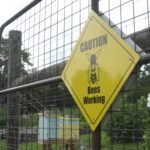

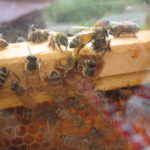
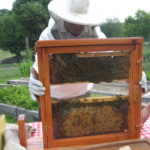
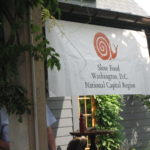
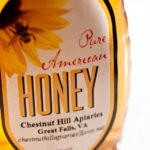
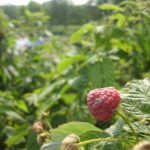
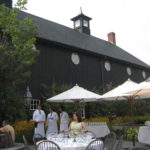
[…] This post was mentioned on Twitter by Stacey Viera, Stacey Viera. Stacey Viera said: Yes, it's raining outside. Why not cozy up with the latest #EveryFoodFits post? http://bit.ly/9zEkPl #BEES! #honey […]
If you have a favorite honey recipe, you can enter it in the Cooking With My Honey Bear recipe contest for a chance to win one of three Le Creuset prizes. Contest ends September 15, 2010.